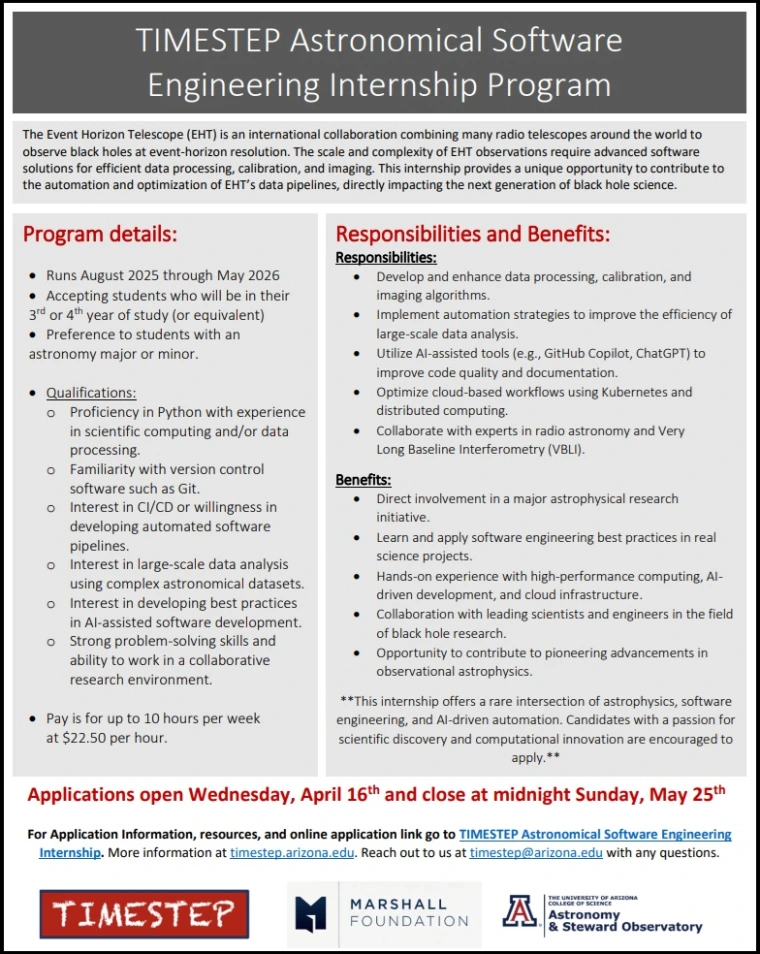We are currently in our first pilot year of the program.
We will have a summer Astro Software Engineering Internship this summer, the application will be available in February 2026.
The application will open in April 2026 for the next academic year internship.
Introduction
The Event Horizon Telescope (EHT) is an international collaboration combining many radio telescopes around the world to observe black holes at event-horizon resolution. Following its historic achievement of capturing the first-ever images of black holes, the EHT is advancing to its next phase: producing "color movies"---multi-frequency observations over multiple black hole dynamic timescales. These data will provide unprecedented insights into black hole physics and their role in the universe. By resolving the structure and evolution of black hole shadows, we will test Einstein’s general theory of relativity in the strongest gravitational fields ever observed. Multi-wavelength and time-resolved imaging will uncover the physics of accretion and plasma turbulence, revealing how matter and magnetic fields interact near the event horizon. These observations will also shed light on jet launching mechanisms, explaining how black holes power relativistic outflows that extract energy and influence their surroundings. Understanding the interplay between black hole jets and the interstellar medium is essential for modeling feedback mechanisms that regulate galaxy evolution across cosmic time.
Internship Overview
The scale and complexity of EHT observations require advanced software solutions for efficient data processing, calibration, and imaging. This internship offers a rare intersection of astrophysics, software engineering, and AI-driven automation. Interns will contribute to the automation and optimization of the Event Horizon Telescope's data pipelines, directly impacting the next generation of black hole science. Candidates with a passion for scientific discovery and computational innovation are encouraged to apply.
Intern Responsibilities
- Develop and enhance data processing, calibration, and imaging algorithms.
- Implement automation strategies to improve the efficiency of large-scale data analysis.
- Utilize AI-assisted tools (e.g., GitHub Copilot, ChatGPT) to improve code quality and documentation.
- Optimize cloud-based workflows using Kubernetes and distributed computing.
- Collaborate with experts in radio astronomy and Very Long Baseline Interferometry (VLBI).
Intern Qualifications
- Proficiency in Python with experience in scientific computing and/or data processing.
- Familiarity with version control software such as Git.
- Interest in CI/CD or willingness in developing automated software pipelines.
(Note: CI/CD stands for Continuous Integration and Continuous Delivery/Deployment, a set of software development practices that automate the integration, testing, and deployment of code, enabling faster and more reliable software releases.) - Interest in large-scale data analysis or willingness to engage with complex astronomical datasets.
- Interest in developing best practices in AI-assisted software development.
- Strong problem-solving skills and ability to work in a collaborative research environment.
Benefits
- Direct involvement in a major astrophysical research initiative.
- Learn and apply software engineering best practices in real science projects.
- Hands-on experience with high-performance computing, AI-driven development, and cloud infrastructure.
- Collaboration with leading scientists and engineers in the field of black hole research.
- Opportunity to contribute to pioneering advancements in observational astrophysics.

Astronomical Software Engineering Internship advertisement:
Guidelines for Applications
2025-26 TIMESTEP Astronomical Software Engineering
Eligibility:
• Must be entering your 3rd/junior year or 4th/senior year, as determined by credits, for the 2025-26 school year.
• Must be enrolled in both fall and spring of 2025-2026 academic school year.
• International students are eligible to apply.
• Preference for a UArizona student majoring or minoring in astronomy.
Qualifications:
● Proficiency in Python with experience in scientific computing and/or data processing.
● Familiarity with version control software such as Git.
● Interest in CI/CD or willingness in developing automated software pipelines.
(Note: CI/CD stands for Continuous Integration and Continuous Delivery/Deployment, a set of software development practices that automate the integration, testing, and deployment of code, enabling faster and more reliable software releases.)
● Interest in large-scale data analysis or willingness to engage with complex astronomical datasets.
● Interest in developing best practices in AI-assisted software development.
● Strong problem-solving skills and ability to work in a collaborative research environment.
Here are some helpful guidelines to help you prepare your application:
1. Do NOT rush to apply! Applications are due at midnight on May 25th. There is no advantage to submitting your application significantly earlier. Take advantage of the resources TIMESTEP offers and take the time you need to prepare your materials (See resources here: https://timestep.arizona.edu/past-meetings-0 and look at the recording from Feb. 26th).
2. Work on your resume. This example tech resume is the required format for this application. Please include all relevant information as shown in the example, including your GPA. View some example undergraduate resumes here. Be sure to include / highlight coding classes, research experiences, significant class projects and technical skills (including programming languages & operating systems).
The College of Science Career Center offers a free resume review for all students. Sign up for an appointment via Handshake. You may want to have a faculty member, postdoc, or grad student in your discipline look over your materials to give you feedback on the technical details.
3. Get an unofficial transcript from the Office of the Registrar to upload: Instructions for online access
4. Complete the online application by midnight May 25th, 2025. You will be asked to upload your resume and transcript, so have those ready in pdf format.
TIMESTEP's Astronomical Software Engineering Internship is supported by the Marshall Foundation; TRIF SEOS; and the Arizona Space Institute.

